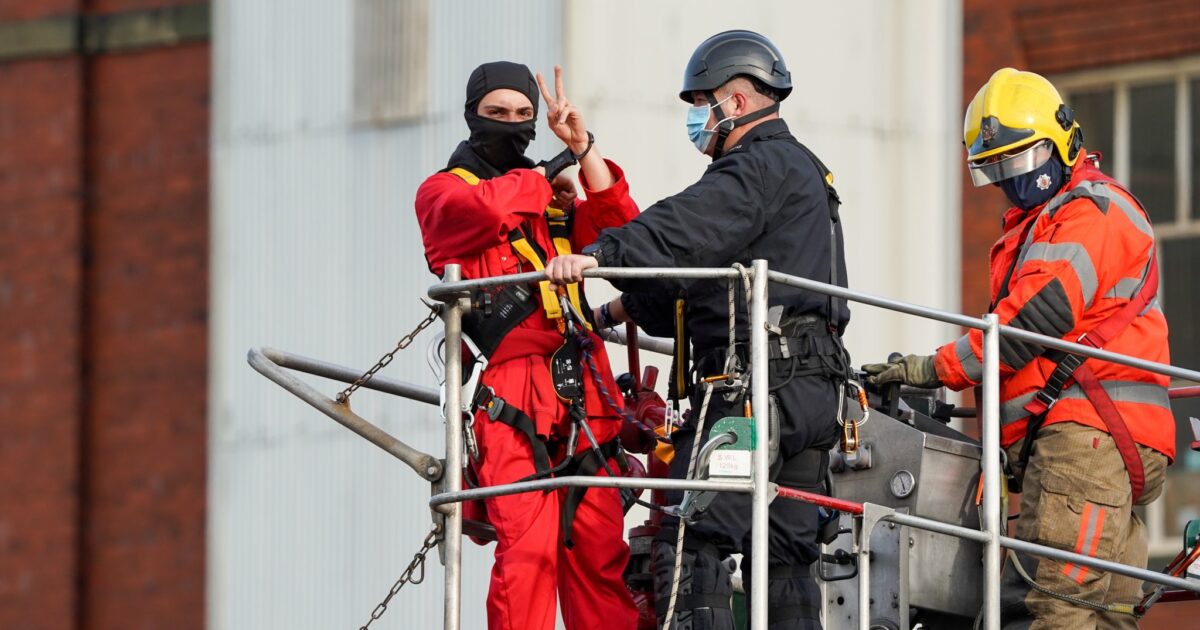Billionaire-backed? Not us. Unlike mainstream media, Novara Media runs on the support of 12,000 people like you, which keeps us editorially independent. Chip in today and help build people-powered media.
“We’re a new breed of activism. We’re not your parents’ Humane Society. … We come with a new philosophy. We hold the radical line. We will not compromise. We will not apologise, and we will not relent.” This is how one activist described Stop Huntingdon Animal Cruelty (Shac), the animal rights group active from the late 1980s to the early 2010s. Shac’s central demand was the closure of Europe’s largest animal testing facility, Huntingdon Life Sciences (HLS). It didn’t ask nicely. Anticipating that the state would never act with the urgency commensurate with such a moral outrage as beating beagle puppies – how true that’s proven to be – Shac set about making the company’s life a misery, smashing up laboratories and picking off suppliers with boycott campaigns. All this nearly bankrupted HLS, until Labour’s science minister Lord Sainsbury personally interceded to keep the company afloat. Unable to tolerate this humiliation, the government sent hundreds of police to round up dozens of Shac members. Ring any bells?
Today home secretary Yvette Cooper confirmed her intention to make Palestine Action (PA) a proscribed terrorist group. The ban was triggered by PA’s spray-painting of two RAF planes in Oxfordshire last week, and is quite clearly a piece of political theatre, not least because the group has taken similar actions in the recent past to zero fanfare. Rather than setting any new precedent for PA, the RAF action provided Cooper with a helpful pretext for something she had wanted to do for some time. The proposed ban is of-a-piece with Labour’s ongoing efforts to trump Reform by cracking down on – often racialised – criminality (see the grooming gangs inquiry). But Cooper is not just posturing to the far right. She is also wielding counter-terror legislation to contain an activist group that has been far too successful for her liking.
Many have correctly pointed out how harmless PA’s actions are in comparison with Israel’s ongoing genocide in Gaza. However, PA has distinguished itself within the Palestine movement, and amongst leftwing activist groups in general, by the severity of disruption it has caused. While successive UK governments have complained noisily about the “chaos” and “crisis” besetting Gaza (it was David Cameron, lest we forget, who in 2010 referred to the strip as an “open-air prison”), PA has done something about it. Much like its puppy-rescuing Shac forbears, PA has cost its primary target – Israel’s largest weapons manufacturer Elbit Systems – vast sums of money, and used many of the same tactics. It has shut down two of Elbit’s factories and chased the company out of its London headquarters. It has isolated Elbit, forcing its metal manufacturer, couriers, property managers and even lobbyists to drop it. It has temporarily halted the manufacture of F-35 parts. It has rendered the company such an unreliable supplier that the Ministry of Defence axed hundreds of millions of pounds’ worth of its contracts, which fell 18% the month one contract was pulled. For five years now, PA has wreaked havoc for Elbit and, thanks to the consciences of jurors and the uselessness of police, mostly gotten away with it.
PA’s continued success represents a major embarrassment to the Labour government. Part of the RAF base was, it has since emerged, secured with little more than a wooden fence. The risk, however, is more than reputational. PA is a menace to both the UK and Israeli governments, which have, much like HLS and Lord Sainsbury, responded as a team. Earlier this month, Declassified reported that Northumbria police spent £210,000 protecting the Newcastle outpost of Pearson Engineering, owned by Israeli weapons company Rafael. This week it found that Elbit lobbied the Home Office to retry PA’s co-founders Huda Ammori and Richard Barnard after they were acquitted in December 2023. The Israeli embassy tried something similar with the attorney general’s office, which has been remarkably obliging. The UK and its ally have poured vast resources into beating back PA, a testament to just how seriously both understand the threat to their individual and joint military and business interests (not to be confused with their citizens’ interests).
Shac’s tactics were considerably more intense than PA’s: the group threatened to harm individuals, which PA doesn’t. But despite their mass imprisonment, Shac was never proscribed as a terrorist group. This alone shows just how flimsy the category of “terrorist” is. For years, Labour and Tory governments have been redefining it (much in the same way as they have redefined unlawful protest from something unduly disruptive to basically anything) to include climate activists (or “eco-terrorists”) and now, Palestine activists. Cooper is not banning PA because its actions are extreme – it is stopping the supply of arms to Israel, which the British public overwhelmingly wants – but because its activists are effective.
Politicians often ham up their anxieties about popular movements to justify repression, but with Palestine Action, it’s not entirely put-on: the group has struck real fear into the heart of the establishment.
Rivkah Brown is a commissioning editor and reporter at Novara Media.
